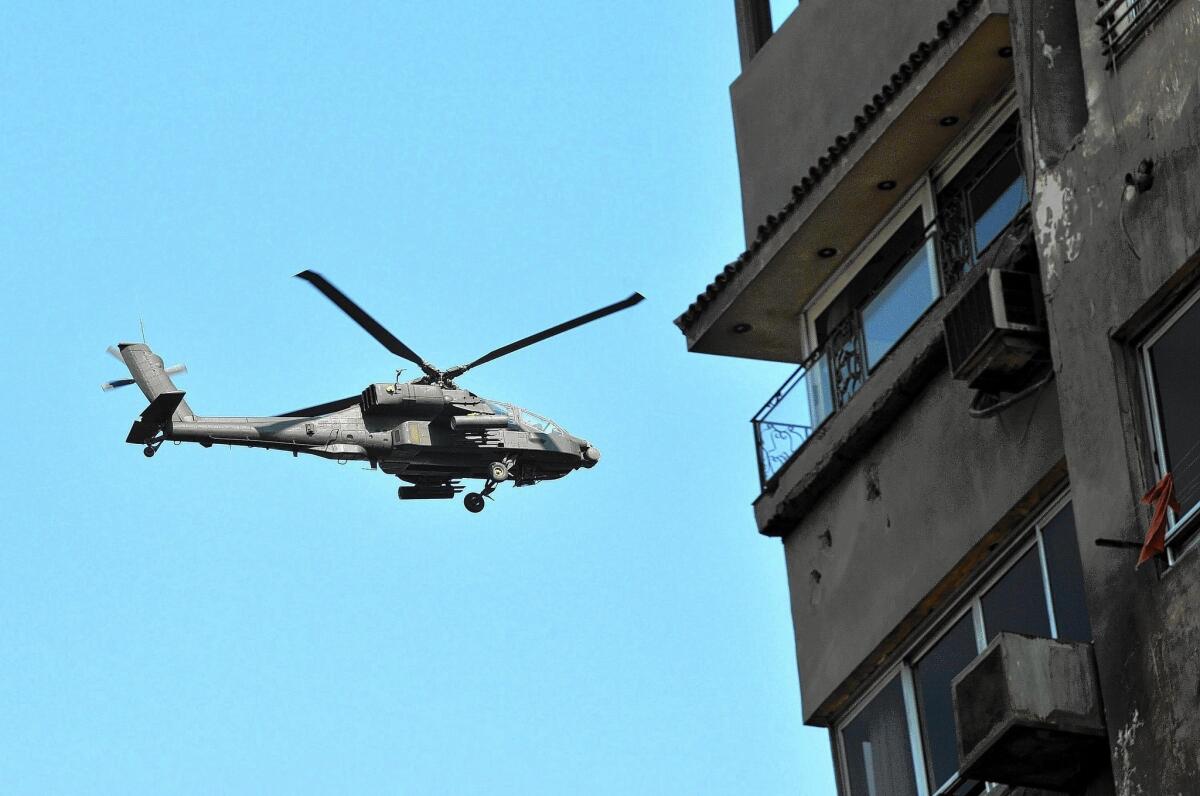U.S. worries its aid to Egypt may be misdirected

- Share via
Reporting from Washington — The Egyptian military recently used American-made Apache helicopter gunships to fire rockets into houses in the Sinai Peninsula, the latest in a series of lethal raids targeting a little-known Al Qaeda-inspired group that has bombed civilians.
The April 23 raid came on the same day that the State Department lifted a hold on military aid to Egypt, announcing that it would send 10 more Apaches and $650 million to help that nation fight extremists in the Sinai desert.
The Obama administration placed the hold last year after a military coup deposed Egypt’s elected leader, Mohamed Morsi.
Although the White House has sharply criticized Cairo’s harsh crackdown on Morsi’s Muslim Brotherhood and other opposition groups, it largely has embraced the aggressive campaign in Sinai against Ansar Bayt al Maqdis, which the State Department has designated as a foreign terrorist organization. The group is not part of the Al Qaeda network but shares its Islamic militant ideology, U.S. officials say.
The militant group took credit for a bus bombing in February that killed three South Korean tourists and an Egyptian driver in Sinai. In January, the militants downed a Russian-made military helicopter, killing several Egyptian soldiers, using a ground-to-air missile, an act that was captured on video.
But with reports indicating that Egyptian security forces may have killed hundreds of people in response, some U.S. officials warn that the Egyptian actions may alienate civilians and spur anti-American sentiment. State Department officials have privately expressed concern about whether Egypt is adhering to U.S. aid rules that prohibit using U.S. weapons against civilians.
“We fear that the Egyptian government’s heavy-handed tactics may be fueling recruitment for ABM or other extremist groups in the region,” a U.S. counter-terrorism official said. “These groups are going to only get stronger if the response from the Egyptian government isn’t more calculated and more discriminating. This is a point that we have made at multiple levels to the Egyptian government.”
The deepening concerns were clear when Egyptian Foreign Minister Nabil Fahmy met Wednesday with members of Congress and others on Capitol Hill. Members expressed support for Egypt’s moves against militants, but pressed Fahmy about the government’s tactics, according to one person present.
Several senior Pentagon officials are meeting Egyptian authorities in Cairo this week. They include Gen. Lloyd J. Austin III, who heads Central Command; Gen. David M. Rodriguez, who heads Africa Command; and Adm. William H. McRaven, who heads Special Operations Command.
The Obama administration has struggled for months to limit the political crackdown launched by former Field Marshal Abdel Fattah Sisi, who now heads the Egyptian government.
The State Department expressed outrage in March when an Egyptian court sentenced 529 Muslim Brotherhood members to death after a two-day trial.
This week, the same court sentenced an additional 683 people to death. Most of the sentences are expected to be commuted to prison terms.
On Tuesday, Sen. Patrick J. Leahy (D-Vt.), who chairs an appropriation subcommittee that oversees foreign aid, blocked delivery of the $650 million in military aid, though not the Apache helicopters. He accused Egypt of “flouting … human rights and appalling abuse of the justice system.”
Leahy and other lawmakers are concerned about reports that Egypt’s military has engaged in indiscriminate shelling of Sinai villages and carried out mass arrests. They are pressing the government in Cairo for an explanation of how it will use the U.S. aid.
“At the same time they are improving security in Sinai, they are undermining stability throughout the rest of Egypt with a crackdown that’s likely to create a violent insurgency for years to come,” said Rep. Adam B. Schiff (D-Burbank), a member of the House Intelligence Committee.
Information remains sketchy, however, about the scale of the government offensive.
The Egyptians “say they have killed 200 to 300 people,” said David Barnett, a Washington-based counter-terrorism analyst with the Foundation for Defense of Democracies who follows events in Sinai. “Locals will say the vast majority of those weren’t militants, but we have no idea.”
“There’s real reason for concern about how arms, including Apaches, are being used,” said Joe Stork, a deputy director of the Middle East region for Human Rights Watch. “There’s quite a bit of destruction. But the whole thing is under wraps — there’s almost zero transparency.”
Stephen McInerney, executive director of the nonpartisan Project on Middle East Democracy, said many Egyptians are wary of the United States and warned that the use of American-built Apaches against civilian areas “could have all kinds of backlash and negative repercussions for Egypt and the United States.”
Dilanian and Richter reported from Washington and King from Cairo.
More to Read
Sign up for Essential California
The most important California stories and recommendations in your inbox every morning.
You may occasionally receive promotional content from the Los Angeles Times.











